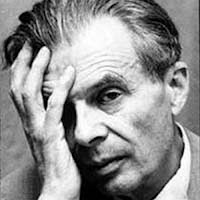Portfolio Due! Brave New World; A Clockwork Orange
Period 1: Your portfolios are due. Please complete your reflection and turn in your work as per usual.
Period 2: Classroom
Both Brave New World and A Clockwork Orange are dystopian novels. You can learn more about dystopian fiction here at this link.
Let me introduce you to your authors:
Aldous Huxley (1894-1963) is best known for his novel Brave New World, but he wrote various other novels (see below). By the end of his life, Huxley was known around the world as one of the most influential 20th century intellectuals. His work is highly satirical and imaginative.
Huxley was born in Godalming, England in 1894 and moved to Hollywood, Los Angeles in 1937. His grandfather, Thomas Henry Huxley, was an eminent zoologist and agnostic. Aldous Huxley studied English literature at Oxford and worked for a time at a technologically advanced chemical plant. Huxley states that this experience of "an ordered universe in a world of planless incoherence" was one source for his novel Brave New World.
He was friends with many of the Bloomsbury writers and close with Modern English author D.H. Lawrence. After moving to Hollywood, Huxley began writing screenplays (including a rejected script for Disney's Alice in Wonderland.) His film adaptations included 1940's films Pride & Prejudice (1940) and Jane Eyre (1944). In Hollywood he was a friend of American author Ray Bradbury. Huxley was a pioneer of self-directed psychedelic drug use, famously reported taking LSD as he lay dying. At that point, what's the harm? He died of laryngeal cancer in 1963.
Huxley wrote criticism, essays, film scripts, plays, and poetry as well as fiction. Some famous Aldous Huxley novels (selected list):
- Crome Yellow (1921)
- Point Counter Point (1928)
- The World of Light (play) (1931)
- Brave New World (1932) (BBC production, 1980)
- Eyeless in Gaza (1936)
- Ape & Essence (1948)
- Island (1962)
He is best known for his novel A Clockwork Orange (1962) in no small part for American audiences because of the film made by Stanley Kubrick (1971). The novel is set in a future "dystopian" London and is told in nadsat, a mixture of Russian and English slang, with gypsy influences and odd bits of Jacobean prose.
Burgess has given explanations for the title of the book. 'One is that it is a Cockney expression ("as queer as a clockwork orange"), which he overheard in a London pub in 1945. In an essay published in The Listener, Burgess claimed that the title was a pun on the Malay word orang, meaning man. And the third explanation is that the title is a metaphor for "an organic entity, full of juice and sweetness and agreeable odour, being turned into an automaton." (prefatory note to A Clockwork Orange: A Play with Music, 1987)'
Burgess was also an accomplished musician, teacher, and expert on James Joyce and Shakespeare. These influences, if you look closely, inspire the narrative, story, setting, and plot throughout the novel. Look, for example, for stream of consciousness, and an epiphany--a moment of understanding.
Still, don't take my word for it, here's an interview with Burgess discussing his book.
For those of you who are finding the novel A Clockwork Orange overly frustrating, I have posted here a link to a Nadsat dictionary for your use. I'd suggest you give the book a few chapters (learning words from context as you go), but if you MUST look up a word to check yourself, feel free.
Our first task today is to write a short summary of the first chapter of your book. Work together in your groups during period 2 to complete a group summary. Turn this in as participation credit. You'll all get a copy. Then, together, evaluate (critical review) the first chapter as well. What's working well in the writing? What isn't? Consider some of these items: character, plot (exposition/inciting incident, complication, rising action, resolution), conflict, setting, theme, dialogue, imagery, description, symbolism, sentence structure, diction, POV, style, or meaning.
Task #2: Please read the packet information about William James (Consciousness) and Pierre Janet (Unconsciousness)--both psychologists will help us understand Freud (he's next). Discuss these concepts. Evaluate them. Do you think these ideas are solid or helpful? Explain/Discuss.
HOMEWORK: Please read chapters 2-3 of your chosen book. For your own notes, please write a short summary of each of the chapters, and be ready to discuss the chapters & major characters in the book Monday. As you read, evaluate the book in similar manner as you did in your book groups. Be prepared to discuss your evaluation with the class on Monday.


Comments